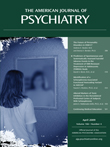Treatment-Resistant Depression and Mortality After Acute Coronary Syndrome
Abstract
Depression is a risk factor for morbidity and mortality in patients with coronary heart disease, especially following acute coronary syndrome. Evidence from recent clinical trials suggests that treatment-resistant depression may be associated with a particularly high risk of mortality or cardiac morbidity in patients following acute coronary syndrome. This article reviews this evidence and considers possible explanations for this relationship. Directions for future research are also considered, with particular emphasis on efforts to elucidate the underlying mechanisms and to develop more efficacious treatments for depression in patients with coronary heart disease.



